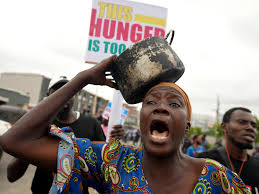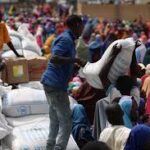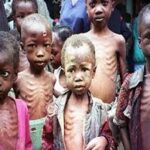Nigeria Faces Unprecedented Hunger Crisis, UN Warns

Abuja, Nigeria — Nigeria is currently grappling with an unprecedented hunger crisis as the United Nations (UN) and humanitarian agencies warn of rising food insecurity across the country. Driven by conflict, economic challenges, climate change, and inflation, millions of Nigerians are at risk of severe hunger and malnutrition, making this one of the most alarming humanitarian emergencies in recent years.
UN Raises Alarm on Food Insecurity
The United Nations Office for the Coordination of Humanitarian Affairs (OCHA) has cautioned that unless urgent interventions are made, millions of Nigerians could fall into acute food insecurity. According to the World Food Programme (WFP), over 26 million Nigerians may face hunger in 2025, particularly in the North-East and North-West regions, which are heavily impacted by insecurity and displacement.
The UN report highlights that the hunger crisis is no longer a distant warning but a present reality. The situation is worsened by high food prices, widespread poverty, and a weak healthcare system unable to meet the growing needs of malnourished children and vulnerable groups.
Conflict and Insecurity Worsen Hunger Levels
Insecurity remains the largest driver of food shortages in Nigeria. Ongoing violence in Borno, Adamawa, and Yobe States has displaced millions, cutting them off from farmlands and livelihood opportunities. Armed banditry and farmer-herder conflicts in the North-West have also disrupted agricultural activities, leading to declining food production.
Farmers in affected regions often abandon their farms for safety, leaving communities heavily dependent on humanitarian food assistance. Unfortunately, insecurity also hinders aid delivery, creating a cycle of vulnerability.
Inflation and Climate Change Add Pressure
Nigeria’s economy has been severely hit by rising inflation, particularly food inflation, which has surged to record highs. Many families are unable to afford basic staples such as rice, beans, and maize.
Additionally, climate change has intensified the crisis. Flooding in parts of the country and prolonged drought in others have disrupted planting and harvesting seasons. The impact is especially harsh in rural communities, where farming is the main source of livelihood.
Children at the Center of the Crisis
The hunger emergency has devastating consequences for children. UNICEF estimates that over 6 million Nigerian children are at risk of acute malnutrition in 2025 if the crisis persists. Severe Acute Malnutrition (SAM) is already claiming lives in conflict-affected regions, with health centers overwhelmed by the influx of starving children.
Medical experts warn that malnourished children are more vulnerable to infections like measles, malaria, and pneumonia, further driving up child mortality rates in Nigeria.
Humanitarian Efforts Under Strain
While the Nigerian government and humanitarian partners are working to respond, funding shortfalls remain a significant challenge. The UN has appealed for over $1 billion to address urgent food and nutrition needs, but less than half of the required funding has been secured.
The World Food Programme (WFP) and Food and Agriculture Organization (FAO) have scaled up interventions, including food distributions, nutrition programs, and support for farmers. However, the needs far outweigh the available resources.
Calls for Urgent Action
Experts and stakeholders are calling for immediate and multi-faceted solutions to Nigeria’s hunger crisis. Recommended actions include:
-
Strengthening agricultural resilience through climate-smart farming and irrigation systems.
-
Improving security to allow farmers safe access to land.
-
Expanding social safety nets to protect vulnerable families from inflation shocks.
-
Boosting humanitarian funding to ensure that aid reaches affected communities.
-
Investing in nutrition programs for children and pregnant women.
Dr. Fatima Akilu, a food security advocate, emphasized:
“This crisis requires urgent government action and international support. Hunger not only threatens lives today but undermines Nigeria’s long-term stability and development.”
Government Response
The Nigerian government has acknowledged the severity of the crisis and pledged to enhance food production through subsidies, mechanized farming, and support for smallholder farmers. The Ministry of Humanitarian Affairs has also partnered with aid agencies to strengthen food distribution channels in conflict-affected regions.
However, critics argue that more needs to be done to address systemic issues such as poor governance, corruption, and inadequate rural infrastructure that continue to fuel hunger across the nation.
Conclusion
Nigeria’s hunger crisis is a national emergency with global implications. The UN’s warning underscores the urgent need for collective action from the Nigerian government, international donors, and humanitarian partners. Without immediate intervention, millions of Nigerians—especially children—risk slipping into life-threatening malnutrition.
As the situation intensifies, the world’s attention is now on Nigeria. Addressing hunger today is not only a humanitarian necessity but also a critical investment in the country’s future stability and development.



